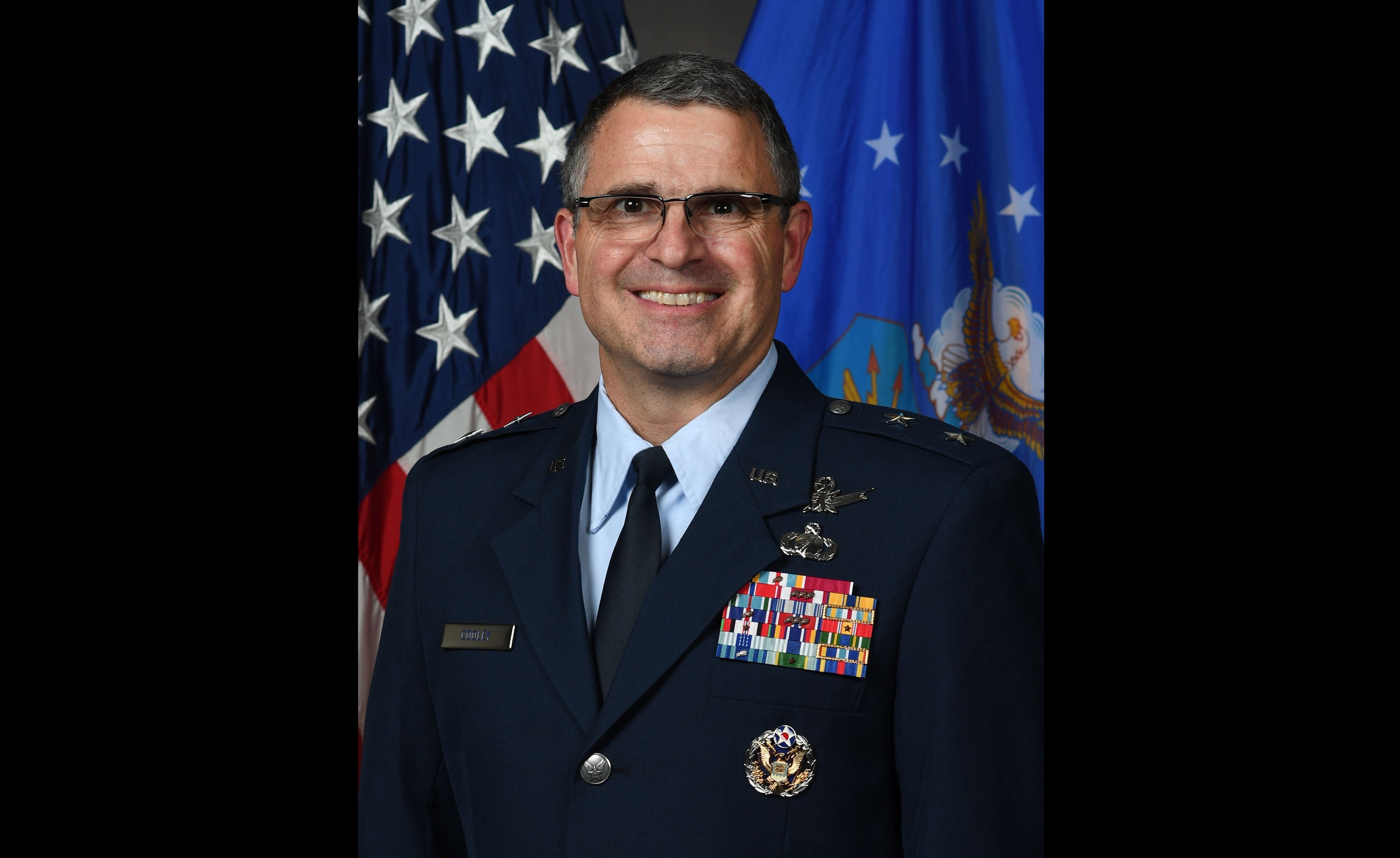A charge of sexual assault has been preferred against Maj. Gen. William Cooley, who in January was fired from command of the Air Force Research Laboratory and investigated by the Office of Special Investigations for alleged misconduct.
The charge and three specifications of violating Article 120 of the Uniform Code of Military Justice was preferred against Cooley on Oct. 29 by Lt. Gen. Gene Kirkland, the initial disposition authority in the case, according to a Tuesday release from Wright-Patterson Air Force Base in Ohio. Article 120 forbids sexual assault.
An Article 32 preliminary hearing will convene on Jan. 27, 2021, during which a senior military judge will review the charge against him, the release said.
If the case proceeds to a court-martial, it would be the first time an Air Force general faced such a trial.
Cooley is accused of making unwanted sexual advances on a civilian woman, who is not a Defense Department employee, while off-duty in Albuquerque, New Mexico, on Aug. 12, 2018.
According to a charge sheet obtained by Air Force Times, Cooley is accused of kissing the woman on her mouth, without her consent, “with an intent to gratify his sexual desire.”
The charge sheet also said Cooley is accused of causing her to touch him sexually, through his clothing, and touching her sexually through her clothing, again without her consent.
RELATED

Cooley’s attorney, Daniel Conway, said in a phone interview that Cooley acknowledged kissing the woman, but said it was a consensual kiss. Cooley denied touching the woman, or causing her to touch him, Conway said.
“Gen. Cooley has cooperated with investigators,” Conway said in a statement provided to Air Force Times. “He has consistently denied the allegations. Because there are voicemail messages from the complainant that actually contradict the accusations, we are confident that Gen. Cooley’s actual innocence will be proven using the words of the accuser.”
Ryan Guilds, the attorney representing Cooley’s accuser, said in a statement to Air Force Times that she “is not interested in trying this matter in the media.”
“She knows what happened and what the evidence will show," Guilds said. “She is confident that when her voice is heard the truth will justify the Air Force’s charges and demonstrate her bravery in coming forward.”
Air Force Times is not publishing the name of the complainant in the case, in keeping with editorial policy regarding accusations of sexual misconduct.
Don Christensen, a former chief prosecutor for the Air Force and the president of the group Protect Our Defenders, which advocates for victims of sexual assault in the military, said that if Cooley goes to court-martial, he will be the first general officer in Air Force history to do so. Christensen said he is also sure that no Air Force general officer in the last three decades — and possibly ever — has had charges preferred against him.
One reason for that, Christensen said, is because other general officers are the ones who decide whether or not to bring charges against their peers.
“This is completely unprecedented,” Christensen said. “I think it’s a reflection of the Me Too movement, the pressure the military’s under right now to handle sexual assault, and the realization that they’re under a microscope by Congress to act in these cases.”
Even as recently as 10 years ago, he said, the Air Force would have simply let general officers quietly retire rather than bring them before a court-martial.
But if the case does go to court-martial, Christensen said it will become logistically complicated. Cooley would need to be tried by a jury of eight peers — three- or four-star generals, or two-star generals who have served in that rank longer than Cooley has. And finding such generals who can be impartial, and don’t personally know Cooley or his case, could be tricky, Christensen said.
The Air Force may have to bring back some retired generals, or bring in general officers from other services, to hear Cooley’s court-martial, if it gets that far, Christensen said.
It is likely the Air Force will choose a jury from a panel of roughly 16 to 20 generals, Christensen said.
“That’s a lot of generals sitting around in a room, waiting to see if they’re selected,” Christensen said.
Air Force Materiel Command head Gen. Arnold Bunch fired Cooley from command of the lab at Wright-Patterson on Jan. 15. At the time, AFMC said Bunch lost confidence in Cooley’s ability to lead, “related to alleged misconduct which is currently under investigation.” AFMC later confirmed that OSI was investigating Cooley.
Bunch, who is the convening authority in the case, appointed Kirkland, who is commander of the Air Force Sustainment Center at Tinker Air Force Base in Oklahoma, as the authority to independently review all available evidence and make an initial disposition decision.
After reviewing the facts in the case, including evidence in OSI’s report of investigation and consulting with legal authorities, Kirkland decided to prefer the charge and three specifications, Wright-Patterson said Tuesday.
An Article 32 is similar to a civilian grand jury. A military judge, presiding as the hearing officer, will review the evidence and could choose to hear witnesses called by the Air Force or Cooley’s counsel to decide if probable cause exists that he violated the UCMJ. The presiding officer will also provide a recommendation on how, or whether, to proceed with any of the offenses supported by the evidence.
Wright-Patterson noted in the release that Cooley is presumed innocent until proven otherwise.
Since Cooley was relieved of command of the lab, he has served as Bunch’s special assistant and worked on AFMC’s digital campaign.
Stephen Losey is the air warfare reporter for Defense News. He previously covered leadership and personnel issues at Air Force Times, and the Pentagon, special operations and air warfare at Military.com. He has traveled to the Middle East to cover U.S. Air Force operations.





